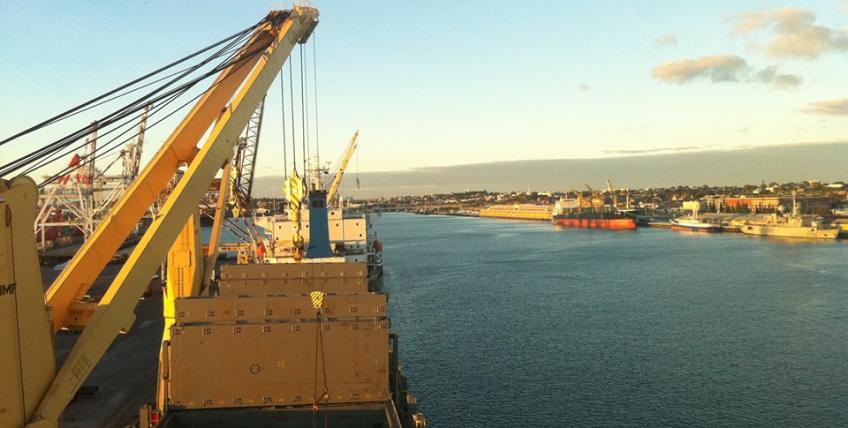How Does Freight Forwarding Work?

How Does Freight Forwarding Work? All Your Questions Answered
In the complex world of international trade and logistics, freight forwarding emerges as a crucial link in the supply chain.
Freight forwarding can involve multiple carriers, various modes of transport, and crossing both state and international borders. This intricate process requires expertise and coordination, making freight forwarding an essential component for businesses engaged in global commerce.
In this article, we’ll explore how freight forwarding works and why engaging a freight forwarder can be beneficial.
How Does Freight Forwarding Work?
Freight forwarding is a specialised service that manages the shipment of goods from one point to another, in a timely manner.
In a nutshell, freight forwarders act as intermediaries between shippers and carriers, coordinating the movement of cargo through different modes of transportation, such as ships, planes, trucks, and trains.
The freight forwarder plans the journey, selecting the best modes of transport for the type of goods, the journey length, the cost, and the reliability of the transport providers. This planning involves a complex web of logistics, taking into account ports, regulations, and necessary documentation.
Once the journey is planned, the freight forwarder coordinates with the chosen transport providers, tracks the freight in real-time, and troubleshoots any issues that arise.
Post-delivery, the freight forwarding company often helps with customs documentation and processes, ensuring that the goods reach their final destination safely and on-time.
1. Documentation and Customs Clearance:
Freight forwarders handle the necessary documentation, including invoices, packing lists, and customs paperwork.
Ensure compliance with international regulations and facilitate smooth customs clearance processes.
2. Route Planning and Carrier Selection:
Determine the most efficient and cost-effective route for transporting goods.
Collaborate with a network of carriers, including sea freight, air freight, trucking companies, and railroads.
3. Booking Cargo Space:
Negotiate and book cargo space with carriers based on the shipment’s size, weight, and destination.
Optimise space utilisation to reduce costs and enhance efficiency.
4. Cargo Consolidation and Deconsolidation:
Combine multiple smaller shipments into one consolidated shipment to achieve economies of scale.
Upon arrival, deconsolidate the cargo to ensure accurate distribution to the respective consignees.
5. Insurance and Risk Management:
Provide cargo insurance to protect against potential loss or damage during transit.
Implement risk management strategies to mitigate unforeseen challenges and delays.
6. Tracking and Monitoring:
Utilise advanced tracking technologies to monitor the real-time movement of shipments.
Keep clients informed about the status of their cargo and any potential disruptions.
What are the Advantages of Freight Forwarding?
Investing in a reliable freight forwarder can result in smoother operations, time savings, and even significant cost reductions for businesses, making them an indispensable part of any robust supply chain strategy.
The key advantages of freight forwarding include:
1. Global Network and Expertise:
Leverage a vast network of carriers, agents, and partners worldwide.
Tap into the expertise of freight forwarders who navigate complex international trade regulations.
2. Cost Efficiency:
Consolidate shipments to optimise space and reduce shipping costs.
Negotiate favourable rates with carriers due to the volume of shipments handled.
3. Time Savings:
Streamline the shipping process, reducing administrative burdens for businesses.
Expedite customs clearance and minimise delays through efficient route planning.
4. Risk Management:
Provide insurance coverage to protect against potential losses.
Proactively manage and mitigate risks, such as weather-related delays or geopolitical issues.
5. Customs Compliance:
Ensure adherence to international trade regulations and customs requirements.
Handle all necessary documentation to prevent delays and penalties.
How Do Freight Forwarders Make Money?
Primarily, freight forwarders make money on their time spent managing the shipping process. They can also make margin on the shipping costs, as well charging for supplementary services, such as handling customs documentation, providing insurance, warehousing, and other value-added services.
How Much Does a Freight Forwarder Cost?
The costs can vary significantly depending on various factors. These factors include the origin and destination of the shipment, the chosen mode of transport, the weight and volume of the goods, the type of goods being transported, and the level of service required.
It’s worth noting that working with a freight forwarder can often lead to cost savings for businesses, thanks to the forwarder’s ability to negotiate lower rates due to their volume of business with carriers.
Freight forwarding plays a crucial role in global trade, bridging gaps and connecting businesses with markets worldwide. A freight forwarder is more than just a transportation service provider; they are an invaluable partner in navigating the complexities of international logistics. They streamline processes, manage risks, and ultimately, ensure that goods get from point A to point B efficiently and cost-effectively.
By understanding what is freight forwarding, businesses can make more informed decisions about their logistics needs, leveraging the unique capabilities of these professionals to drive success.
If you’re looking for a freight forwarder in Perth, Australia, please contact the friendly team at MCL today.


